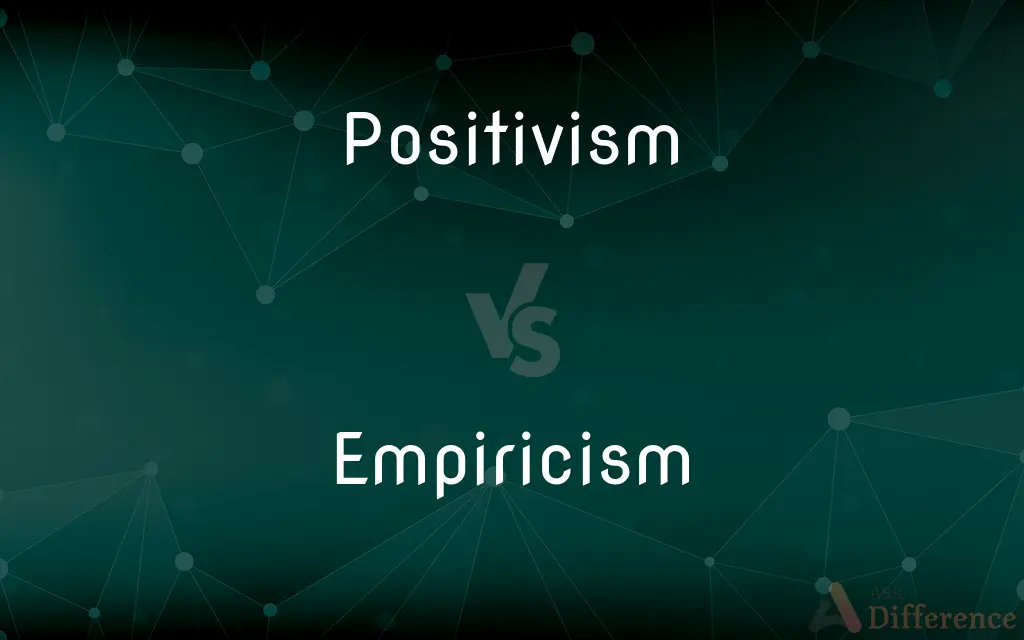Positivism vs. Empiricism — What's the Difference?
By Tayyaba Rehman — Updated on October 25, 2023
Positivism is a philosophical stance emphasizing scientific knowledge as the ultimate truth, while empiricism believes knowledge stems from sensory experience.

Difference Between Positivism and Empiricism
Table of Contents
ADVERTISEMENT
Key Differences
Positivism and Empiricism are both philosophical approaches to understanding knowledge, but they emphasize different aspects. Positivism is rooted in the idea that the only authentic knowledge is scientific knowledge. This means that truth is found in scientifically verified facts and the scientific method. On the other hand, Empiricism posits that all knowledge originates from sensory experience.
While Positivism strongly relies on objective observations and scientific processes, it often rejects metaphysical explanations, considering them unverifiable. Empiricism, meanwhile, centers on the belief that experience, especially sensory perception, is the primary source of knowledge. It doesn't necessarily exclude other forms of understanding but prioritizes experiential data.
Positivism may be seen as a broader approach, with its belief that society, like the physical world, operates under general laws. It suggests that these laws can be understood through scientific methods. In contrast, Empiricism primarily focuses on individual sensory experiences as the foundation for concepts and knowledge, often without delving into overarching societal structures.
Historically, Empiricism gave rise to the scientific method, emphasizing observation and experimentation. Positivism, while adopting these methods, expanded the realm to include social sciences, asserting that they too can be studied scientifically. Both share a commitment to knowledge, but their approaches and emphases differ considerably.
Comparison Chart
Origin of Knowledge
Scientific knowledge and methods.
Sensory experience.
ADVERTISEMENT
View on Metaphysics
Generally rejects metaphysical claims as unverifiable.
Doesn't necessarily reject, but prioritizes experiential data.
Scope
Includes both physical and social sciences.
Primarily focuses on individual sensory experiences.
Historical Influence
Influenced sociology and social sciences.
Gave rise to the scientific method in natural sciences.
Key Principle
Scientific methods provide the ultimate truth.
Knowledge is derived from sensory perception.
Compare with Definitions
Positivism
Belief in observable and verifiable facts.
Due to her positivism, she always sought concrete evidence.
Empiricism
The theory that all knowledge originates from sensory experience.
Empiricism emphasizes the importance of firsthand observation.
Positivism
A philosophy emphasizing the role of science in understanding knowledge.
Many sociologists adopt a positivism approach to study societal patterns.
Empiricism
Opposition to theories without empirical evidence.
Empiricism often challenges purely conceptual theories.
Positivism
Rejection of metaphysical claims as unverifiable.
His positivism led him to dismiss supernatural explanations.
Empiricism
Reliance on experience as the source of ideas and knowledge.
His empiricism meant he trusted his own observations above all.
Positivism
The application of the scientific method to social phenomena.
The research utilized positivism to understand cultural trends.
Empiricism
The practice of relying on observation and experimentation.
Modern science owes much to the principles of empiricism.
Positivism
The theory that societal laws can be understood scientifically.
Positivism drives many modern social studies courses.
Empiricism
Belief in experiential data over innate ideas.
Empiricism argues against the idea of inborn knowledge.
Positivism
Positivism is a philosophical theory that holds that all genuine knowledge is either positive—a posteriori and exclusively derived from experience of natural phenomena and their properties and relations—or true by definition, that is, analytic and tautological. Thus, information derived from sensory experience, as interpreted through reason and logic, forms the exclusive source of all certain knowledge.Verified data (positive facts) received from the senses are known as empirical evidence; thus positivism is based on empiricism.Sociological positivism holds that society, like the physical world, operates according to general laws.
Empiricism
In philosophy, empiricism is a theory that states that knowledge comes only or primarily from sensory experience. It is one of several views of epistemology, along with rationalism and skepticism.
Positivism
A doctrine contending that sense perceptions are the only admissible basis of human knowledge and precise thought.
Empiricism
The view that experience, especially of the senses, is the only source of knowledge.
Positivism
The application of this doctrine in logic, epistemology, and ethics.
Empiricism
Employment of empirical methods, as in science.
Positivism
The system of Auguste Comte designed to supersede theology and metaphysics and depending on a hierarchy of the sciences, beginning with mathematics and culminating in sociology.
Empiricism
An empirical conclusion.
Positivism
Any of several doctrines or viewpoints, often similar to Comte's, that stress attention to actual practice over consideration of what is ideal
"Positivism became the 'scientific' base for authoritarian politics, especially in Mexico and Brazil" (Raymond Carr).
Empiricism
The practice of medicine that disregards scientific theory and relies solely on practical experience.
Positivism
The state or quality of being positive.
Empiricism
Medicine as practised by an empiric, founded on mere experience, without the aid of science or a knowledge of principles; folk medicine, quackery.
Positivism
(philosophy) A doctrine that states that the only authentic knowledge is scientific knowledge, and that such knowledge can only come from positive affirmation of theories through strict scientific method, refusing every form of metaphysics.
Empiricism
(philosophy) A doctrine which holds that the only or, at least, the most reliable source of human knowledge is experience, especially perception by means of the physical senses. (Often contrasted with rationalism.)
Positivism
(legal) A school of thought in jurisprudence in which the law is seen as separated from moral values; i.e. the law is posited by lawmakers (humans).
Empiricism
A pursuit of knowledge purely through experience, especially by means of observation and sometimes by experimentation.
Positivism
A system of philosophy originated by M. Auguste Comte, which deals only with positives. It excludes from philosophy everything but the natural phenomena or properties of knowable things, together with their invariable relations of coexistence and succession, as occurring in time and space. Such relations are denominated laws, which are to be discovered by observation, experiment, and comparison. This philosophy holds all inquiry into causes, both efficient and final, to be useless and unprofitable.
Empiricism
Used to describe research based on methodology shaped from empirical philosophy (see above), e.g. surveys, statistics, etc.
Positivism
The form of empiricism that bases all knowledge on perceptual experience (not on intuition or revelation)
Empiricism
The method or practice of an empiric; pursuit of knowledge by observation and experiment.
Positivism
A quality or state characterized by certainty or acceptance or affirmation
Empiricism
Specifically, a practice of medicine founded on mere experience, without the aid of science or a knowledge of principles; ignorant and unscientific practice; charlatanry; quackery.
Empiricism
The philosophical theory which attributes the origin of all our knowledge to experience.
Empiricism
(philosophy) the doctrine that knowledge derives from experience
Empiricism
The application of empirical methods in any art or science
Empiricism
Medical practice and advice based on observation and experience in ignorance of scientific findings
Common Curiosities
Can a researcher be both a positivist and an empiricist?
Yes, they can blend both perspectives, relying on scientific methods based on sensory experiences.
Can social phenomena be studied using Positivism?
Yes, Positivism believes social phenomena can be studied scientifically.
Is Positivism the same as Empiricism?
No, while both prioritize knowledge, Positivism emphasizes scientific methods, and Empiricism focuses on sensory experience.
Does Empiricism reject innate ideas?
Generally, Empiricism believes knowledge comes from experience, not inborn ideas.
Does Positivism accept metaphysical claims?
Typically, Positivism rejects metaphysical claims as they're often unverifiable scientifically.
Does Positivism reject philosophy?
Not entirely, but it rejects claims that can't be verified scientifically.
Which approach prioritizes sensory perception?
Empiricism emphasizes knowledge derived from sensory perception.
Which philosophy influenced the rise of the scientific method?
Empiricism played a key role in shaping the scientific method.
Which approach values individual experiences?
Empiricism values individual sensory experiences as a foundation for knowledge.
What role does observation play in Positivism?
In Positivism, observation is key but should be backed by scientific verification.
Is Positivism limited to natural sciences?
No, Positivism also applies to social sciences, believing they can be studied scientifically.
What's a key criticism of Positivism?
Critics say Positivism can be too restrictive, ignoring valuable non-scientific insights.
Does Empiricism support the idea of intuition?
Empiricism would typically challenge claims based purely on intuition without experiential evidence.
How does Empiricism view theoretical concepts?
Empiricism tends to challenge concepts without empirical evidence backing them.
Can metaphysical ideas be compatible with Empiricism?
While Empiricism prioritizes sensory data, it doesn't inherently dismiss metaphysical ideas.
Share Your Discovery

Previous Comparison
Paraphrase vs. Rephrase
Next Comparison
Amber vs. StrollAuthor Spotlight
Written by
Tayyaba RehmanTayyaba Rehman is a distinguished writer, currently serving as a primary contributor to askdifference.com. As a researcher in semantics and etymology, Tayyaba's passion for the complexity of languages and their distinctions has found a perfect home on the platform. Tayyaba delves into the intricacies of language, distinguishing between commonly confused words and phrases, thereby providing clarity for readers worldwide.














































